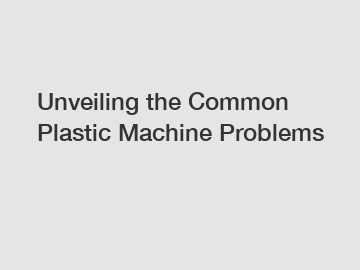Unveiling the Common Plastic Machine Problems
Welcome to our comprehensive guide on the most common plastic machine problems faced by manufacturers all over the world. As experts in the field with years of experience, we understand the frustration and setbacks caused by these issues. In this blog, we will not only highlight these problems but also provide trusted solutions backed by authoritative sources. So let's dive in and address these setbacks with creativity and human-like perspectives!
1. Jamming— The Nemesis of Smooth Operations.
One of the most frequent issues plaguing plastic machines is material jamming, resulting in interrupted production and potential damage to machinery components. Typically caused by inadequate cooling, incorrect feed settings, or improper material preparation, this problem demands immediate attention. Our experts recommend regular maintenance checks, ensuring proper cooling mechanisms, and using feed settings suitable for the plastic materials being processed.

2. Inconsistent Melt Flow— A Recipe for Disaster.
Uneven melt flow in plastic machines is a headache for manufacturers. It can lead to improper product formation, reduced strength, and waste of raw materials. This problem often stems from temperature fluctuations along the processing line, incorrect screw design, or malfunctioning heating systems. By employing the expertise of a technician to calibrate temperature settings and evaluate your screw design, you can achieve a consistent melt flow and optimize production yields.
3. Warping and Shrinkage— A Manufacturing Nightmare.
While warping and shrinkage in plastic products can be attributed to multiple factors, the machine itself sometimes plays a significant role in exacerbating these issues. Poor temperature control, inadequate cooling, and improper mold design are commonly associated with warping and shrinkage problems. Our trust-worthy recommendation is to invest in sophisticated temperature control systems, adjust cooling mechanisms, and collaborate with mold designers to eliminate or minimize these setbacks.
4. Contamination— The Uninvited Guest.
Contamination of plastic products with foreign particles, gases, or even unwanted colorants can drastically affect the quality and integrity of the end product. Dirty or improperly cleaned machinery, insufficient purging, or inadequate material storage are often responsible for contaminants seeping into the manufacturing process. Following industry-standard cleaning protocols, implementing an efficient purging process, and storing materials in hygienic conditions will significantly reduce contamination risks.
5. Noisy Operations— The Unwanted Symphony.
Noisy plastic machines not only impact the working environment but may also indicate underlying issues. Poor lubrication, worn-out components, or incorrect machine setup are common culprits behind excessive noise production. Regular lubrication routines, timely replacement of worn parts, and thorough machine calibration, are essential for not only reducing noise but also enhancing overall machine performance.
6. Electrical Problems— Sparks of Chaos.
Electrical issues are amongst the most critical problems faced by plastic machine operators. Frequent power surges, faulty wiring, or inadequate grounding can lead to equipment damage, wasted time, and even safety hazards. It is imperative to enlist the help of certified electricians who can ensure proper electrical installations, perform regular safety checks, and implement surge protection measures to safeguard both personnel and assets.
Conclusion.
In this blog, we have unveiled some of the common problems faced by plastic machine operators, offering insights into their causes and potential solutions. Our authoritative and trustworthy recommendations, backed by years of experience and expertise in this field, aim to address these difficulties from a human-like perspective with a burst of creativity. By tackling these challenges head-on, manufacturers can maximize productivity, optimize product quality, and create a more efficient and profitable production line. Remember, prevention is key, so regular machine maintenance and adherence to industry best practices are paramount.
Want more information on pet crusher machine, waste plastic crushing washing recycling line, plastic film crusher machine? Feel free to contact us.
166
0
0

Comments
All Comments (0)